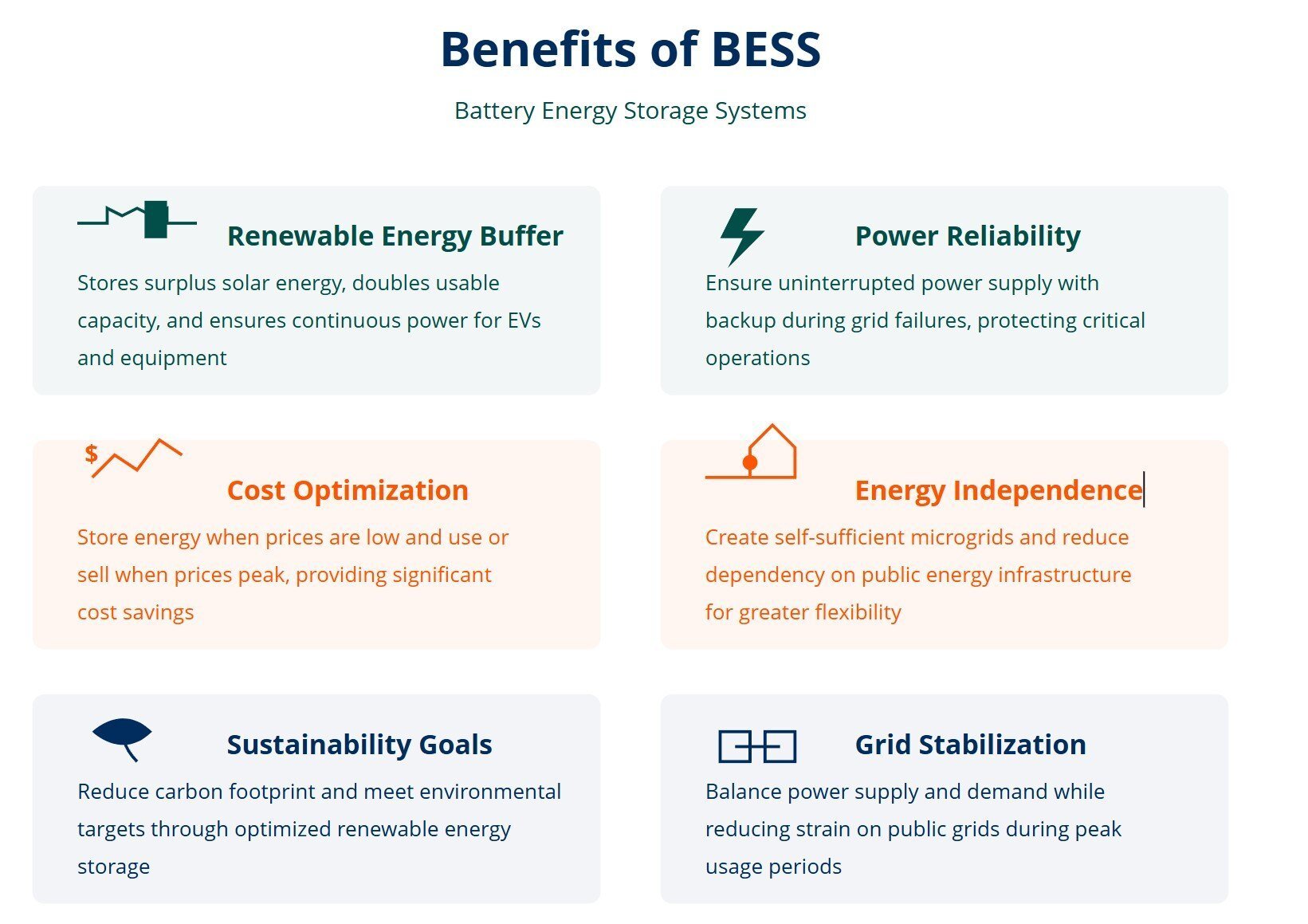Battery Energy Storage Systems (BESSs) have proven to be an essential technology for companies navigating an increasingly complex and volatile energy landscape. With 92% of businesses saying rising energy costs and instability impact profitability and competitiveness, there is a clear need for reliable and affordable clean energy sources.
For organizations looking to reduce carbon footprints, battery storage systems provide a way to store electricity from renewable sources and use it when needed. By stabilizing power supply and optimizing resource use, large-scale storage solutions support sustainability goals while keeping operations running smoothly.
Why Battery Energy Storage Is Crucial
Governments worldwide are pushing for cleaner alternatives to fossil fuels. The European Union’s (EU) target for carbon neutrality by 2050 is a prime example, leading businesses to adopt wind and solar power. However, these sources are weather-dependent, making energy storage crucial for maintaining a reliable supply. While a manufacturing facility in the vibrant deserts of Arizona would significantly benefit from on-site solar panels, the same cannot be said for a site in the cloudy biome of the United Kingdom.
A battery storage system bridges this gap by capturing excess power when supply exceeds demand and redistributing it during shortages. This approach ensures consistent output, especially for businesses in industries requiring uninterrupted operations.
Key Benefits of Battery Energy Storage

Balancing Renewable Energy Fluctuations
A BESS helps maintain stability by storing surplus electricity generated from solar panels and wind farms. This stored capacity is then available when natural conditions change, preventing dips in productivity. Grid operators also benefit, as stored reserves can be used to manage peak power demands and reduce dependency on fossil fuel-based backups.
Lowering Operational Costs
Battery storage systems allow businesses to take advantage of off-peak electricity pricing. Companies can charge their systems when rates are low and discharge them during peak times, avoiding high costs. Some businesses even generate revenue by selling excess stored power back to the grid when demand spikes.
Supporting Sustainability Goals
Many industries are under pressure to meet environmental regulations. Battery energy storage solutions help companies reduce their reliance on fossil fuels by optimizing the use of clean energy. This transition not only cuts emissions but also helps businesses stay ahead of regulatory changes.
Ensuring Reliable Energy Supply
Unexpected outages can result in significant financial losses. A well-integrated BESS serves as a backup power source, protecting operations from downtime. Whether due to extreme weather, infrastructure failures, or supply chain disruptions, having a dedicated storage system ensures essential functions continue without interruption.
Building Flexibility and Independence
The ability to store and control electricity consumption offers companies greater flexibility. By integrating battery storage with smart grid technology, businesses can respond to market fluctuations, adopt efficient consumption strategies, and reduce dependence on unpredictable external suppliers.
Increasing Grid Stability
BESS solutions play a critical role in supporting public electricity grids by preventing overloads during peak demand periods. With peak shaving capabilities, businesses can limit their draw from the grid during high-usage times, reducing strain on public infrastructure and improving overall reliability.
Best Practices for Implementing a BESS
To fully leverage battery energy storage, companies should consider these key factors:
- Integration with Existing Systems: A BESS works best when combined with Energy Management Systems (EMS), Electric Vehicle (EV) charging stations, and grid-connected renewable sources. This approach creates a seamless infrastructure that optimizes power use across all operations.
- Adoption of Advanced Technologies: Artificial Intelligence (AI), the Internet of Things (IoT), and Digital Product Passports (DPPs) improve efficiency by enabling predictive maintenance and battery lifecycle optimization. Digital tools enhance monitoring and automate energy-saving processes.
- Choosing Reliable Suppliers: Long-term success depends on selecting manufacturers that offer ongoing technical support and system upgrades. As battery technology advances, working with adaptable providers ensures compatibility with future innovations.
Interested in learning more about battery energy storage? Check out the following content from ABI Research:

